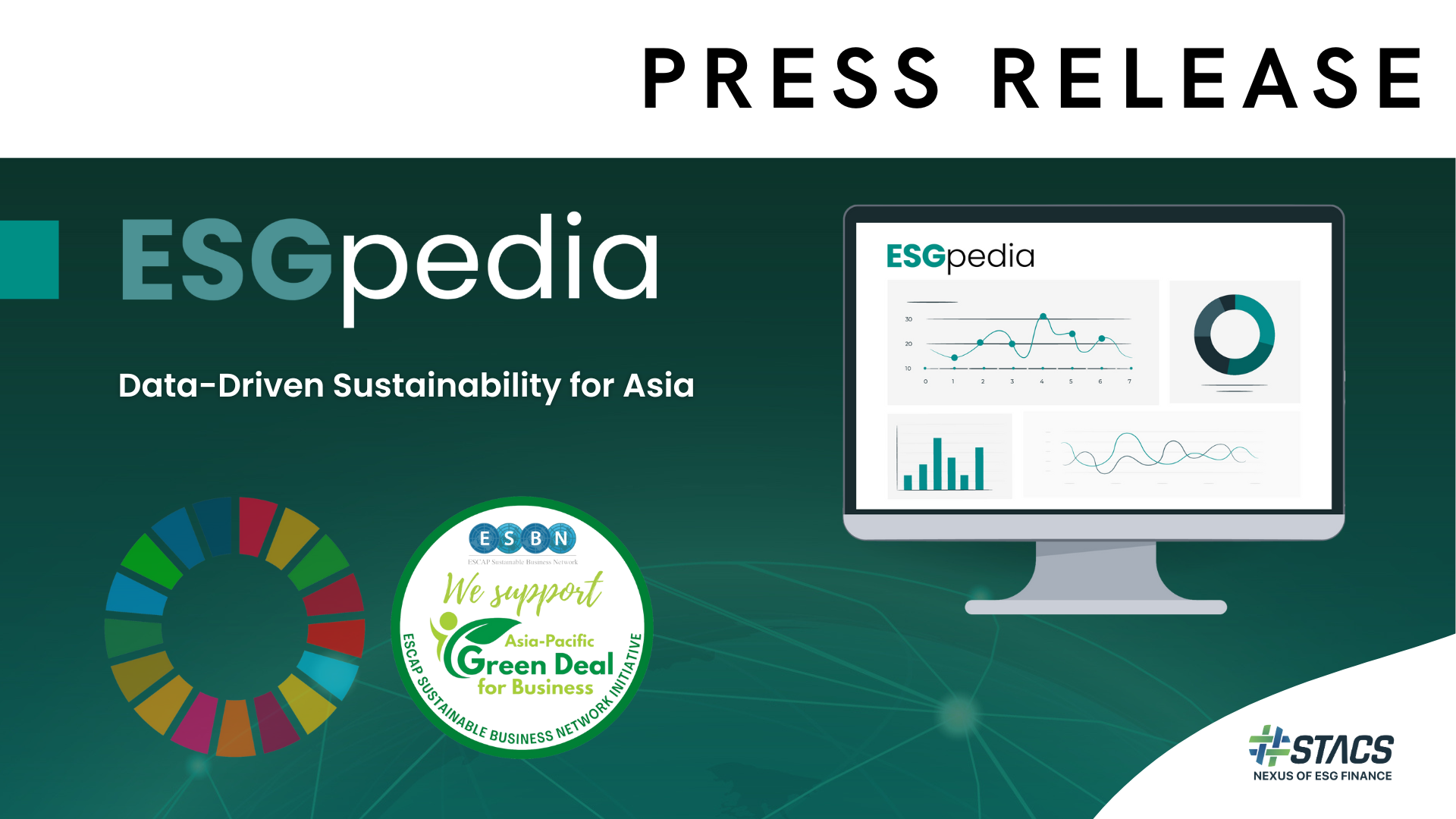Hashstacs Pte Ltd (‘STACS’) has launched the latest ESGpedia platform version, at its one-year milestone since its deployment in May 2022. Covering over 5 million sustainability data points, with leading banks and corporate clients onboard, ESGpedia is Asia’s leading ESG data and technology solution. The latest platform combines greater data coverage, enhanced solutions and analytics, and assessment tools to help financial institutions, corporates, and SMEs embark on decarbonisation and achieve strategic sustainability goals.
The SaaS-based registry provides one of the most comprehensive global company coverage, with 180,000+ companies’ sustainability data, of which 73,000+ company profiles have full corporate data overlaid and standardized by STACS’s AI-powered engine. This allows banks and corporates to easily and confidently access accurate, consistent, and comparable data on a one-stop registry for sustainable financing, ESG risk monitoring of portfolio, as well as to monitor the sustainability performance of suppliers.
Amidst mounting pressures from regulators and stakeholders globally, there has been a growing need for better, more granular asset-level data for in-depth ESG risk and sustainability assessment by banks and corporates. With Asia being a key player in global supply chains, companies are also facing a pressing ESG data gap in terms of coverage for SMEs across Asia, especially in ASEAN. This is key as SMEs represent 90% of business supply chains, according to the World Economic Forum[1].
To resolve these critical ESG data gaps, ESGpedia aggregates ESG certificates, credentials, and sustainability disclosure data points from a vast range of global verified sources, with a focus on ASEAN. Through AI technology, a company’s data points from disparate sources are harmonised into a single verified and standardized ESG profile, allowing banks and corporates a one-stop holistic view of all the ESG efforts by the company.
While SMEs play a pivotal role in driving a sustainable future in Asia and in ensuring the competitiveness of Asia’s supply chain, they typically lack sufficient resources, making the ESG reporting and sustainability process daunting and challenging.
To advocate for business leadership in implementing the 2030 Agenda for Sustainable Development, the ESCAP Sustainable Business Network (‘ESBN’)[2] has partnered with STACS to launch the ESBN Asia-Pacific Green Deal for Businesses Program, on ESGpedia.
The ESBN Asia-Pacific Green Deal for Businesses on ESGpedia provides a digitalised and simplified self-assessment tool designed to lower the barriers to entry for corporates and SMEs to kickstart their sustainability journey through a form of an easy and guided program towards sustainability, and to report metrics that are aligned with stakeholders’ needs for consistent, comparable, and shareable data. The digital assessment supports the United Nations’ Sustainable Development Goals.
Benjamin Soh, Founder and Managing Director at STACS, said: “Banks and corporates are increasingly seeking consistent and comparable primary ESG data of companies to support strategic decision-making. We are thrilled to partner with ESCAP Sustainable Business Network (ESBN), to launch the digital self-assessment on ESGpedia. Combined with our expanded data coverage across certifications and credentials, the ESBN Asia-Pacific Green Deal self-assessment allows us to rapidly grow our primary data coverage of companies, especially SMEs, to better serve the needs of our users.”
By completing the self-assessment, businesses will be awarded an ESBN Asia-Pacific Green Deal badge, to showcase their commitment to sustainability to investors and customers, and strengthen their competitive edge across Asia.
Dr George Lam, Chair of ESBN, said: “The ESBN Asia-Pacific Green Deal for Business recognises the role of major companies and SMEs in driving sustainable development, and was born to help them overcome resource challenges and kickstart the sustainability journey more easily. Our partnership to launch the self-assessment on STACS’s ESGpedia is extremely synergistic as it serves as a seamless and digital way for businesses to create their ESG profile, and amplify their sustainability efforts to potential customers, business partners, investors and financiers, while at the same time contribute to the bigger goal of better, more granular data for sustainability across the Asia Pacific region.”
Other than greater data coverage and digital assessment tools for corporates and SMEs, the latest ESGpedia platform offers enhanced solutions and analytics, including Green Credentials Checker, Supplier Sustainability Monitoring, Conditional Screening and Monitoring, and more.
These solutions enable financial institutions to achieve various strategic sustainability outcomes, including positive screening to scale up green financing deals, deepen client engagement and stewardship, as well as enhance its risk management and market value.
Corporates are also empowered to streamline their net zero journey, by having greater visibility of their ESG commitment to potential customers, investors, and financers, as well as enhancing their supply chain and environmental risk management.
The latest ESGpedia’s solutions were showcased at STACS’s industry event on 23 May 2023, with the attendance of financial institutions and corporate leaders. The sharing was led by several partners including MUFG Bank, UOB, Maxeon Solar Technologies, and Teo Garments, as they highlighted use cases of ESGpedia enabling data-driven sustainability across various sectors.
Sharon Yuen, Chief Commercial Officer at STACS, said: “An ecosystem-wide approach across technology, regulators, organisations, banks, and businesses of all sizes, is central to Asia’s plans to scale sustainable development towards Net Zero. ESGpedia serves as an epicentre of a rapidly growing ecosystem of partners across the region, and it is precisely this power of network that unlocks further value for our users. As of today, the registry is already supporting multiple industries across Asia towards Net Zero, including Built & Construction, Fashion & Textile, Food & Agriculture, Transportation & Logistics, Energy, and more.”
The latest features and tools of ESGpedia underline the fintech’s commitment to continually enhance the platform to meet the evolving needs of users, as companies navigate corporate sustainability goals amidst rising regulatory scrutiny.
Upcoming pipelines include deepening capabilities in data and AI for effective digital analytics, as well as expanding support for more corporate programs to enable streamlined data validation and processes for corporates and SMEs. To future-proof, there is also planned support for regulation and taxonomy analysis as they continually evolve.
Within the growing community of ESGpedia users, which includes corporates, investors, and financers, there are also plans to strengthen support and establish incentive mechanisms to further scale the platform and tap on the value of network.
[1] World Economic Forum article (16 Jan 2023) – https://www.weforum.org/agenda/2023/01/why-supporting-smes-is-critical-for-a-global-trade-stability-and-and-a-more-inclusive-economy/
[2] ESCAP Sustainable Business Network (ESBN) – https://www.unescap.org/esbn
For further information, please contact:
STACS (www.stacs.io)
Grace Lim, Senior Marketing Manager
Email: [email protected]
About STACS
STACS (Hashstacs Pte Ltd) is a Singapore-headquartered FinTech company focused on ESG FinTech, operating ESGpedia, which powers the Monetary Authority of Singapore’s (MAS) Greenprint ESG Registry. STACS serves as the Nexus of ESG Finance with ESG data across multiple industries, as well as digital solutions for the financial sector to scale decarbonisation financing, and corporates and SMEs to attain their ESG goals. Empowering industries across Asia towards Net Zero, its clients and partners include global financial institutions, corporates, and SMEs. For more information, please visit www.stacs.io.
PRESS CONTACTS
If you are a journalist with media queries, contact us.




